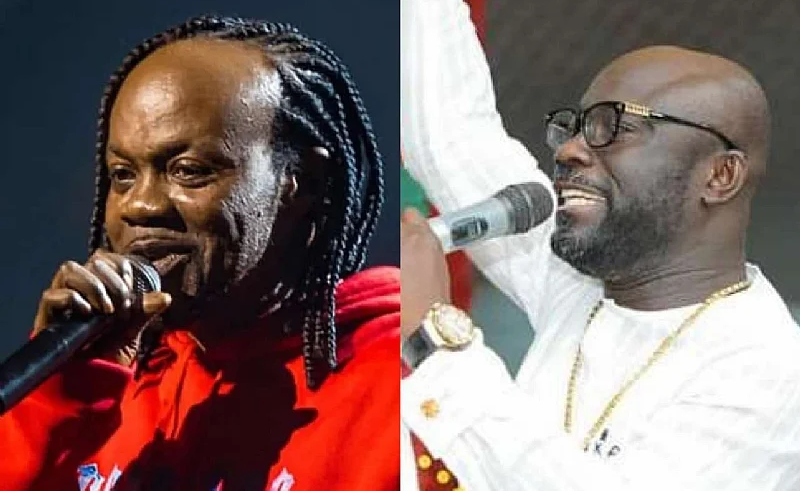A Legacy Undervalued: The Untimely Passing of Daddy Lumba and the Call for Greater Appreciation of Living Legends
The recent passing of highlife music icon Daddy Lumba has sent shockwaves throughout Ghana’s entertainment industry and beyond. Amidst the outpouring of grief and tributes, a poignant question arises: did Ghana truly celebrate this musical giant while he was alive? Arnold Kojo Asante, renowned event organizer and CEO of Imajin Advertising and Fusion Global, believes not. Asante, who orchestrated a memorable tribute to Lumba in 2012, awarding him a $25,000 gold medal at the inaugural Legends and Legacy Ball, laments what he perceives as a collective failure to fully acknowledge and appreciate Lumba’s immense contributions to Ghanaian music and culture during his lifetime. His sentiments echo a broader concern about how Ghana, and perhaps Africa as a whole, often reserves its highest accolades for its artists only after they are gone.
Asante’s personal connection to Lumba adds a layer of poignancy to his reflections. He recounts a recent conversation with the late musician, a testament to Lumba’s continued engagement and interest in the music industry. This interaction, happening not long before Lumba’s passing, serves as a stark reminder of the vibrancy and potential that has been lost. It underscores Asante’s disbelief and the sense of unreality surrounding Lumba’s death, a feeling shared by many who admired the artist. The suddenness of the loss amplifies the regret over missed opportunities to further celebrate Lumba’s life and work.
The Legends and Legacy Ball, the brainchild of Asante and his team, was conceived precisely to address this gap – to honor living legends and acknowledge their contributions while they could still witness the appreciation and bask in the recognition. Asante criticizes the perfunctory nature of many awards ceremonies, where artists are often presented with little more than wooden plaques, a stark contrast to the grand gesture of the solid gold medal bestowed upon Lumba. This act was not mere extravagance, but a symbolic statement about the true value of Lumba’s artistry and its impact on Ghanaian music. It was a tangible expression of respect and admiration, a recognition of a legacy that transcended generations.
Asante’s assessment of Lumba’s recognition is unequivocal: he believes the artist was not celebrated enough. He recalls the outpouring of support from fellow musicians during the 2012 event, citing Kofi Nti’s offer to perform for free as a testament to the deep respect and influence Lumba commanded within the music community. This anecdote highlights not only Lumba’s personal magnetism but also the collective understanding of his significance to the industry. It demonstrates that the appreciation for Lumba’s talent was widespread, yet somehow, this did not translate into sustained, public acknowledgements commensurate with his stature.
Asante’s call for a state burial for Lumba further underscores the depth of his respect and the belief that Lumba’s contributions warrant national recognition. He argues that a state burial would be a fitting tribute, a symbolic gesture that would acknowledge the profound impact Lumba had on Ghanaian society. Citing the example of Jesus Christ, Asante emphasizes that the length of a life is not the sole measure of its significance, but rather the impact it makes. He believes Lumba lived a full and impactful life, contributing immeasurably to the cultural tapestry of Ghana.
Asante’s plea extends beyond the specific case of Daddy Lumba. He uses this moment of mourning to issue a call to action for Ghanaian musicians and event organizers. He urges his fellow musicians to support and encourage organizers who endeavor to celebrate living legends. He believes that greater collaboration and support would enable the creation of more meaningful and substantive tributes, enriching the lives of both the artists and their fans. He points to the Legends and Legacy Ball as a benchmark, a demonstration of what is possible when there is a genuine commitment to celebrating artistic excellence. The resurgence of conversations about reinstating this event suggests that there is a growing awareness of the need for more platforms that recognize and honor the contributions of Ghana’s cultural icons while they are still alive to appreciate the recognition. The loss of Daddy Lumba has served as a poignant reminder of the importance of celebrating our legends not just in their passing, but throughout their lives, ensuring that their invaluable contributions to our cultural heritage are recognized, appreciated, and celebrated with the respect and admiration they deserve.
The outpouring of grief following Daddy Lumba’s passing is a testament to his enduring popularity and influence. However, it also raises uncomfortable questions about whether Ghana truly values its living legends. Asante’s reflections and call to action serve as a powerful reminder that appreciation should not be postponed until the end of a life. The story of Daddy Lumba should serve as a catalyst for a shift in how Ghana celebrates its cultural icons – a shift towards greater recognition, appreciation, and support for living legends, ensuring that they receive the accolades and acknowledgment they deserve while they are still among us to witness and appreciate their impact.














